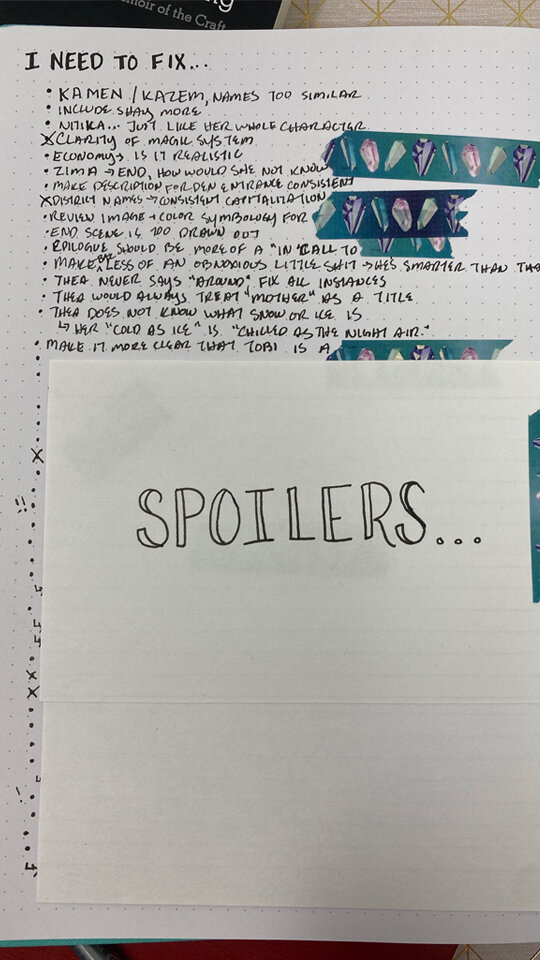I Need to Fix… Collection
Editing is hard. Really hard. A small change in the first few pages of your book can cause ripples that turn into waves throughout the rest of your work. It feels like a never-ending cycle of rewriting and tweaking and fixing. How do you keep track of all the fixes you need to make without messing up your book?
Enter: The I Need to Fix… Collection
Do you ever feel overwhelmed by just how much editing you have to do? You notice one little thing that needs to be changed and suddenly a ripple of changes sets off through your work. Wouldn’t it be nice to have a magic hammer like Fix-It Felix to make everything perfect?
Tracking What You Need to Fix
While I can’t give you a fix-it-all hammer [and - though it’s tempting - I don’t recommend smashing your computer with one] I can give you the most simple collection I use every time I write: The “I Need to Fix…” collection.
First, a note on Collections. In Bullet Journaling, a collection is basically a group of similar items that make sense to be kept together. In my personal BuJo, have a collection of gift ideas for my husband, a collection of seeds I want to try in my garden, and a collection of books people like you have recommended to me. This is a collection of edits to make and details to fix in Call to Fire, all neatly kept in one place to reference.
How does this spread work?
This spread works as a running list of items to update, revisit, or fix during your editing process. I keep this page open while I’m drafting, and if I notice something awry, I write it down to fix later. Because if you try to edit as you write, you often end up in a spot where perfection is the enemy of good (and the enemy of “done”). You can track anything you want. Some of my items include:
Fixing Nitika’s whole character [she needs some work]
Better explaining the magic system and its limitations
Making it more clear that Tobi is a REDACTED [there’s like one person who knows what Tobi actually is, hi Maggz ILY]
Odd but important grammar and syntax nitpicks
Thea has always lived in the desert, so she doesn’t know what snow or ice are. She would never say something like, “My fingers felt cold as ice,” because she doesn’t know what that means. Instead she might say, “My fingers felt chilled as the night air,” because that is her reference for temperature fluctuation.
Thea also doesn’t use the word “around.” It’s not a word common among her people, so she grew up without it in her speech. Instead she says “round,” which is not a natural thing to type, so I need to remember to fix it while I edit.
While editing, if I make a fix, I mark off that I’ve completed the update. If the fix causes a ripple effect and more things need to be sorted out, I jot those down too.
I Need to Fix … quite a few things actually. No one’s perfect.
Reminder: The first draft of anything is shit, according to Hemingway. It’s okay - good, even! - if your collection of things to fix is long. What’s important is that you note your edits so you can address them when the time is right.
Character Updates: This is a good place to write down changes you made - or want to make - to a character, so that you have a reference to use while you edit the whole book. Nitika’s character needs significant work to be believable and to fit in with the world. I wrote that here so I can remember to fix all instances of her appearance in Call to Fire.
Clarity: As you’re rereading your work, if something doesn’t seem clear to you, it won’t be clear to the reader, either. Use this collection to note unclear items that need your attention.
Consistency: Consistently describing people or places is so important, and if you struggle with that, jotting down a note in your collection will help you make sure you maintain consistent descriptions during the editing process. [Check out the Location Spread for expanded info on consistently describing locations.]
Spoilers: Most of this spread is covered up because there are so many spoilers. But I wanted to show at least some of things that need my attention, so you have a reference for what kinds of things might fit in this collection for your book.
When you’re editing, you can use this spread as a reference to track changes you’ve made and ones you still need to address. This will save you time during the editing process because you aren’t flipping through multiple Word documents or scrolling through thousands of words trying to remember that one little nit you needed to address. It also helps keep you focused on writing. Instead of getting distracted by the edits you need to make, you can jot them down to address later and focus on drafting.
[I use a B5 notebook for my Writing BuJo. My favorites are from Archer & Olive. [Clicking this link takes you to A&O, and YOU get a 10% discount, and I get a discount!]
What do you think?
Tracking all the things you need to edit can be overwhelming, and I hope this collection is an extra tool in your toolbox to organize your story. I’ve found it helpful to keep this page in my journal bookmarked for easy access when I’m editing Call to Fire. If you found this spread helpful - or if you have feedback or questions - I’d love to hear from you. DM me on Instagram @RowanTheWriter_ or send me an email.

